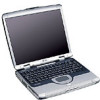Compaq Evo Notebook PC n115 Users Guide Evo Notebook N115 - Page 27
Don'ts, Surge Protectors, Why Use AC Power When I've Got a Battery?, When you're not on the go
 |
View all Compaq Evo Notebook PC n115 manuals
Add to My Manuals
Save this manual to your list of manuals |
Page 27 highlights
Using Your Notebook Don'ts Don't leave the AC adapter plugged into the electrical outlet when it is not connected to your notebook. Don't place anything on power cords or cables. Arrange them so that no one accidentally steps on or trips over them. Surge Protectors Using surge protectors and line conditioners can substantially reduce the risk of electrical shock and aid in protecting your notebook from power-source problems. During a power surge, the voltage level of electricity coming into your notebook can increase and cause data loss or system damage. Protect your notebook and peripherals by connecting them to a surge suppressor, which absorbs voltage surges and prevents them from reaching your notebook. Why Use AC Power When I've Got a Battery? When you're not on the go, you'll want to use your notebook's AC adapter as your power source. This method ensures that the battery is always charged. When your notebook does not have a charged battery, you should save your work and turn off your notebook before unplugging it from the AC power supply. S Did you know... When a charged battery is in your notebook, you can simply unplug it from AC power. Your notebook automatically switches to battery power. Users Guide 3-3















